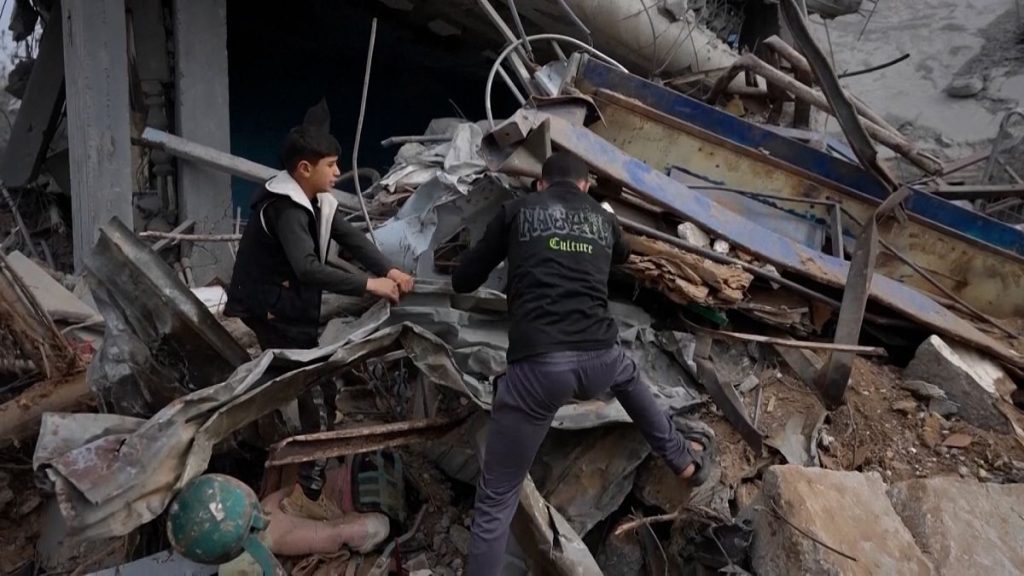The fragile ceasefire agreement reached between Israel and Hamas, halting 15 months of relentless conflict, has unveiled a scene of utter devastation in Gaza. Returning Palestinians are met with a landscape scarred beyond recognition, their homes reduced to rubble, their lives shattered. The sheer scale of destruction testifies to the ferocity of the fighting, leaving a profound humanitarian crisis in its wake. The once-vibrant neighborhoods now lie in ruins, a stark reminder of the human cost of protracted conflict. This grim reality underscores the urgent need for comprehensive humanitarian aid and long-term reconstruction efforts to address the immediate needs of the displaced population and pave the way for a sustainable recovery.
The physical destruction extends beyond individual homes, encompassing vital infrastructure essential for the daily lives of Gazans. Hospitals, schools, power grids, and water sanitation systems have been severely damaged or completely destroyed, exacerbating an already precarious humanitarian situation. The lack of access to basic necessities like clean water, sanitation, and healthcare poses significant risks to public health and further complicates the recovery process. The shattered infrastructure represents a monumental challenge for rebuilding efforts, requiring substantial international support and long-term investment to restore essential services and create a foundation for future development. The devastation of these vital systems highlights the vulnerability of civilian populations during armed conflict and underscores the importance of protecting essential infrastructure.
The psychological toll of the conflict is equally profound, leaving deep scars on the minds of Gazans, particularly children who have witnessed unimaginable violence and loss. The constant fear, displacement, and the traumatic experiences of the past months have left many struggling with psychological trauma, anxiety, and depression. The long-term mental health consequences of this conflict are a serious concern, requiring specialized support services and programs designed to address the psychological needs of the affected population. The invisible wounds of war demand attention and resources to ensure the psychological well-being of Gazans and their ability to rebuild their lives. Healing these invisible wounds is crucial for fostering resilience and enabling individuals to cope with the trauma they have endured.
The humanitarian crisis in Gaza is further compounded by the pre-existing challenges of poverty, unemployment, and blockade restrictions, which have long hampered the territory’s development. The conflict has intensified these existing vulnerabilities, pushing the already struggling population deeper into despair. The combination of widespread destruction, displacement, and economic hardship creates a complex and multi-faceted humanitarian challenge requiring a comprehensive and coordinated response from the international community. Addressing the root causes of the crisis, including the blockade, is crucial for achieving long-term stability and preventing future cycles of violence. The need for sustainable development initiatives that address economic disparities and create opportunities for Gazans is more urgent than ever.
The immediate priority is to provide emergency relief to those most affected by the conflict, including shelter, food, water, medical supplies, and psychosocial support. The humanitarian community is working tirelessly to deliver essential aid to the displaced population, but the scale of the needs is immense, requiring significant financial resources and logistical coordination. The international community must step up its efforts to ensure that adequate funding and resources are available to meet the urgent needs of the affected population. A swift and coordinated response is critical to alleviate suffering and prevent further deterioration of the humanitarian situation. Addressing the immediate needs of the population is essential for laying the groundwork for long-term recovery and reconstruction.
Beyond the immediate relief efforts, a long-term strategy for rebuilding Gaza is essential, focusing on reconstructing homes, restoring infrastructure, and revitalizing the economy. This will require substantial international investment, technical expertise, and a commitment to building back better, incorporating sustainable development principles and climate resilience. Reconstruction efforts must also prioritize local ownership and empowerment, ensuring that Gazans are actively involved in shaping the future of their communities. Creating a sustainable and resilient future for Gaza necessitates addressing the underlying political and economic challenges that have fueled the conflict, promoting inclusive governance, and investing in human capital development. Building a peaceful and prosperous future for Gaza requires a comprehensive approach that addresses the multifaceted dimensions of the crisis and empowers the Palestinian people to rebuild their lives.














